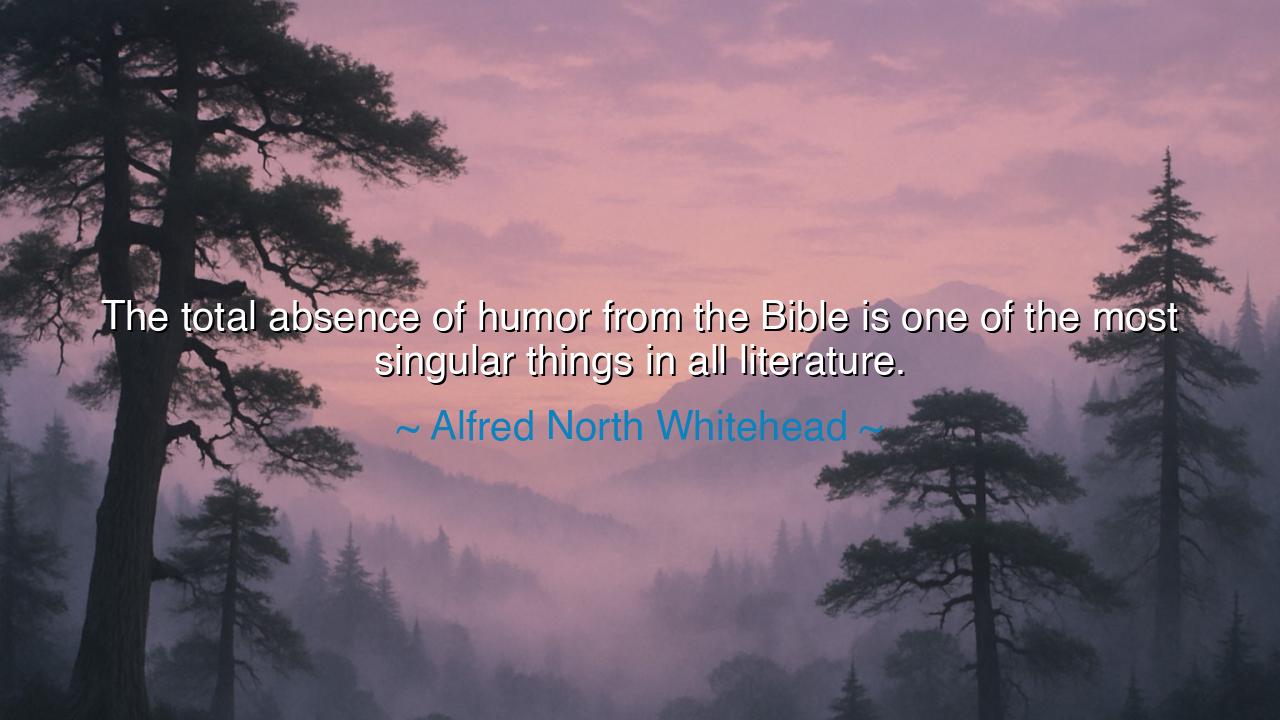
The total absence of humor from the Bible is one of the most
The total absence of humor from the Bible is one of the most singular things in all literature.






In the solemn yet piercing words of Alfred North Whitehead, philosopher of the eternal and interpreter of civilization, we hear a thought that startles as much as it enlightens: “The total absence of humor from the Bible is one of the most singular things in all literature.” This reflection is not an act of irreverence but of wonder — a meditation on why one of the greatest and most influential books of all time, the fountain of moral law and divine poetry, stands apart from nearly every other work of the human spirit in its solemnity. For in all its beauty, tragedy, and wisdom, there is almost no laughter. The Bible, vast and eternal, speaks of sin and salvation, creation and apocalypse, love and wrath — but it rarely, if ever, smiles.
To understand this, one must step into the mind of Whitehead, a philosopher who believed that all human expression — art, science, and faith — was part of a cosmic search for meaning. His observation of the Bible’s lack of humor was not mockery but insight. He saw that the text, in its gravity, reflects the early human soul in its awe before the divine. The writers of sacred scripture did not laugh because they were standing in the thunderous presence of God. In the beginning of civilization, the relationship between humanity and the divine was not one of familiarity, but of trembling reverence. The laughter of man could not echo in the shadow of the Almighty — not because laughter was sinful, but because it seemed too small before infinity.
And yet, Whitehead’s words reveal something deeper about the nature of humanity itself. For in the absence of humor, we glimpse the seriousness with which our ancestors viewed the drama of existence. They did not yet dare to jest about their condition; they were still discovering what it meant to live, to die, to believe. The Bible, therefore, is not empty of laughter by accident, but by design — it was written in the voice of those who still walked in fear and faith beneath the gaze of Heaven. They saw the world as sacred, and in that sacredness, there was awe, but not levity.
However, as centuries passed and man grew in understanding, humor became one of the soul’s instruments of wisdom. The ancients of later times learned that laughter, too, could be holy — that irony could reveal truth just as parable could. The philosopher Socrates, though never writing scripture, wielded humor like a scalpel, exposing the pretensions of his peers with gentle mockery. He laughed not to belittle, but to awaken. And Jesus, though solemn in the text of the Bible, spoke in parables that carried the faint glimmer of wit — images of camels passing through needles, of blind men leading the blind — humor as a mirror for folly. Thus, even within sacred silence, the seeds of humor were hidden, waiting for humanity to mature enough to see that laughter is not the enemy of holiness, but its companion.
History, too, gives us countless examples of how humor has served the sacred and the wise. When Abraham Lincoln guided a broken nation through the fire of civil war, he often disarmed hatred with stories and gentle jest. “I laugh,” he said, “because I must not cry.” His humor was not frivolous — it was a weapon of grace. It lifted the spirit of a nation drowning in blood. In him we see what Whitehead implies — that humor, though absent from holy scripture, has become one of the divine gifts by which humanity survives its own despair.
Perhaps Whitehead saw in this absence not a flaw, but a challenge — a reminder that sacredness and joy are not yet reconciled in the human heart. The Bible is serious because life was serious to those who wrote it. But now, in our time, when we can see both the tragedy and the comedy of our existence, it falls to us to complete the balance. To bring laughter where once there was fear; to smile at the mystery, not in defiance, but in faith. For laughter, too, can be an act of worship — the sound of the soul recognizing that creation, though vast and terrifying, is also tender and good.
So let this be the teaching: do not mistake solemnity for holiness, nor humor for disrespect. The divine may not laugh in scripture, but it laughs through us. When we see our own folly and smile at it, we come closer to wisdom than through judgment alone. When we can laugh with compassion — at our vanity, our struggles, our mortal pride — we join the eternal dance between sorrow and joy.
Thus, Alfred North Whitehead, in his quiet observation, invites us to restore the sacred art of laughter to the realm of the spirit. Let us read the world, as we read the Bible, not only with awe, but with wonder — for wonder, too, can laugh. Let our humor be pure, our joy be reverent, and our laughter be the echo of the divine heart, reminding us that the universe, though serious in purpose, was born of light.






AAdministratorAdministrator
Welcome, honored guests. Please leave a comment, we will respond soon